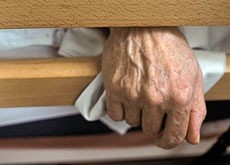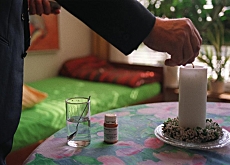Zurich hospital rejects assisted suicide

Zurich University Hospital has revealed that a ban on assisted suicide on its premises has been in place since the beginning of February.
Leading Swiss hospitals have been debating whether to allow assisted suicide on their premises since Lausanne University Hospital decided in 2005 to allow assisted suicide under strict conditions from January 1, 2006.
Zurich hospital said on Thursday that the directive applied not only to hospital personnel but also to any visitors. However assisted suicide groups can still visit patients.
“The directive is intended to be robust and practical regarding everyday questions,” said Georg Bosshard, head of clinical ethics at Zurich University Hospital.
For example, when a patient’s desire to end his or her life clashes with the hospital’s fundamental job of curing patients, the directive is explicit in forbidding any form of assisted suicide within hospital walls. Those wanting to die may however leave the hospital.
Patients may still receive visits from assisted suicide groups such as Exit and Dignitas, and if they express a desire to die, they have the right – like all patients – to a report giving medical information such as their diagnosis and prognosis.
Christian Schwarzenegger from the Institute of Legal Medicine at Zurich University said such a report in no way constituted participation in suicide.
In those cases where a patient who wants to die is no longer capable of leaving the hospital, the hospital would try to find an individual solution, according to Urs-Martin Lütolf, head of the radio-oncology clinic.
“The important thing is to reach a consensus with everyone involved,” he said.
Elsewhere
In 2005 Lausanne University Hospital took the decision to permit assisted suicide under strict conditions from January 1, 2006.
The hospital in western Switzerland said it would allow the voluntary euthanasia group, Exit, to help terminally ill patients who are unable to go home.
It said patients wishing to take their own lives must have expressed a persistent wish to die, be of sound mind, suffer from an incurable disease and carry out the final act themselves.
Lütolf pointed out that in the past six months six people had asked for help in assisted suicide at Lausanne University Hospital and only one had gone ahead with it – three had backed out and two were considered not of sound mind.
Geneva University Hospital has offered the same options to patients as Lausanne since 2006.
Pressure
Pressure for controls on assisted suicide have been mounting in recent years, partly because Switzerland has gained a reputation for “death tourism”.
In October 2006 a national ethics commission recommended that there should be more external controls in place for people using suicide assistance organisations to end their lives.
The Swiss National Advisory Commission on Biomedical Ethics said organised suicide assistance should only be permitted for people suffering from serious illnesses.
The commission noted that since there was a legal framework for assisted suicide, it was important to make sure that organisations carrying out the practice were properly controlled.
In June 2006 the Swiss government said legislation governing assisted suicide in Switzerland was sufficient and it had no plans to tighten the rules.
swissinfo with agencies
Swiss law tolerates assisted suicide where the act is committed by the patient and the helper has no direct interest.
There are several organisations in Switzerland, such as Exit and Dignitas, which help terminally ill patients choose how to die.
Every fifth suicide in Switzerland, where the suicide rate is significantly higher than the global average, is assisted – in Zurich the figure is one in three.
Euthanasia, illegal in Switzerland, is defined as administering a lethal drug to a person by a doctor or medical staff.
The Swiss Academy of Medical Sciences issued guidelines to doctors in 2004 laying down for the first time conditions under which they could help terminally ill patients die.
In Europe, only the Netherlands and Belgium permit taking the life of a person who wishes to die.

In compliance with the JTI standards
More: SWI swissinfo.ch certified by the Journalism Trust Initiative



You can find an overview of ongoing debates with our journalists here. Please join us!
If you want to start a conversation about a topic raised in this article or want to report factual errors, email us at english@swissinfo.ch.